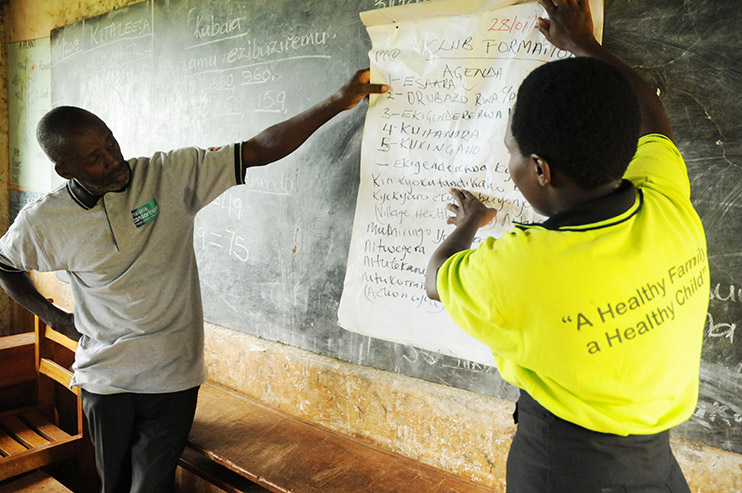
In Uganda, the inSCALE project has supported the implementation of an innovative community engagement approach called Village Health Clubs. The Village Health Clubs aim to improve child health through a community led forum with the community health workers (CHWs) as the main focus point. Village Health Club meetings are intended to provide a forum where CHWs and community members who are part of the club can work together to identify child health and CHWs challenges. They use village networks, knowledge, creativity and other community assets to help solve child health problems.
Community health workers are facilitating the clubs using a learning, planning and action cycle. Health club members rank child health challenges faced by their community using picture cards and decide which one to focus on for each of the cycles. They discuss solutions, which include supporting CHW services, and take actions to meet these challenges. The clubs are open to all members of the village and designed to be fun while focusing on the CHWs as the main village health asset.
The CHW facilitator encourages members to plan and carry out the club’s activities while also promoting group decision-making and ownership in order to gain tangible results. Village members developing solutions to local health challenges are a key focus of the village health club approach.

Credit: Malaria Consortium/Tine Frank
The Village Health Clubs are based on five guiding principles which aim to inspire community members to pull together and act, and encourage members and community leaders to use the clubs for the purpose they are intended. These principles are: open to all; village owned; intended to support CHW work; strength based (using village assets); and fun and focused.
Village Health Clubs will increase the community’s understanding of what CHWs can and cannot do and their potential to improve child health in the village. In doing so village health clubs will improve the status and standing of CHWs as key village health assets, increasing their motivation and quality of service provision. This increased understanding could mean a greater demand for CHW services and the number of children accessing them may increase. In addition the actions of health club members will communicate to the community health workers and other village members that their work is important, of value and appreciated.
The training of CHWs to facilitate the health clubs reinforces and adds to the skills acquired during integrated community case management (iCCM) training and may also improve quality of care.
Village health clubs will hopefully become valued village forums, increasing community health worker and village capacity to address health issues in their communities and ensure children are receiving timely, effective and appropriate treatment.